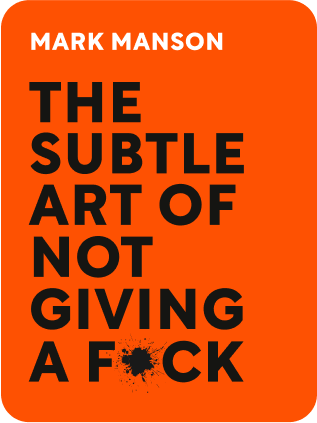

This article is an excerpt from the Shortform book guide to "The Subtle Art of Not Giving a F*ck" by Mark Manson. Shortform has the world's best summaries and analyses of books you should be reading.
Like this article? Sign up for a free trial here .
We’re constantly told to care about everything—our image, our success, how many likes we get. But what if the secret to happiness is actually caring about less? Mark Manson’s The Subtle Art of Not Giving a F*ck flips conventional self-help advice on its head. Instead of chasing positivity and more of everything, he argues we should get pickier about what deserves our attention and energy.
Keep reading for our overview of this book and discover why pain isn’t the enemy, why feeling special might be holding you back, and how to focus on what truly counts.
Overview of The Subtle Art of Not Giving a F*ck
In his book The Subtle Art of Not Giving a F*ck, Mark Manson argues that our consumer culture and social media have us chasing the wrong things in pursuit of happiness and a meaningful life. We are giving a f*ck or caring about too many things that don’t matter and don’t make us happy in the long run.
We are urged by social media and society to give a f*ck about everything. We are told to always be striving for more—more happiness, money, experiences, friends, possessions. The self-help movement urges us to focus on being positive and feeling good. But all the focus on positivity actually emphasizes what we lack—and so we keep striving.
Manson argues that, as a result, we become addicted to phoniness, and we constantly pursue superficial things. This creates temporary highs rather than true happiness. We end up frustrated and feel that we are falling short in comparison to what we see in social media, which celebrates only the most extraordinary. Or, we develop the belief that we are entitled to always feel good.
But, he argues, success, fame, and fleeting self-improvement don’t lead to satisfaction. The key to a happy, meaningful life is to give a f*ck about less, and focus only on what is most valuable and important to us.
Manson’s book will help you:
- Clarify what is important and unimportant to you.
- Realize that giving a f*ck about fewer and different things changes your direction in life.
- Understand that it’s OK to feel bad, or for things to go badly in life.
- Accept that pain is inevitable, and you can use it as a catalyst for improvement.
- Learn how to care about fewer things (give fewer f*cks).
| The Philosophical Foundation of the Subtle Art The advice in The Subtle Art of Not Giving a F*ck comes largely from three different philosophical traditions—Stoicism, Existentialism, and Buddhism. For context to Manson’s advice, here’s a general overview of each philosophy. Stoicism values reason and duty above all else. In Meditations (one of the definitive Stoic texts) Marcus Aurelius says that the only meaningful use of your time is to find out what you’re meant to do in the world, and then do it. Aurelius also says that how you feel—and how others feel about you—doesn’t matter; every action you take should be driven by rational thought and devotion to your purpose. Existentialism values personal choice and personal growth. It’s rooted in the idea that life is meaningless, and therefore you must make your own meaning. An existentialist should determine what values and beliefs he or she holds, and then devoutly follow them. However, it’s crucial that those beliefs and values are personal, and not instilled by someone else. Buddhism values acceptance and tranquility. These values are exemplified in stories of how the Buddha dealt with the evil god Mara: Rather than fighting against him, the Buddha would greet Mara as a friend and invite him in for tea. Following the Buddha’s example, a Buddhist tries to meet any experience—positive or negative—with calm acceptance. |
Hurdles to Giving Fewer F*cks
Manson cautions that when we choose to give fewer f*cks (that is, to reprioritize what we care about and what we don’t), we’ll make mistakes before we master the art, including the following.
Misunderstanding Happiness
Manson believes that, contrary to what society tells us, happiness isn’t an equation to be solved or an achievement attained when we do the right things. He argues that being unhappy and dissatisfied is part of life, and also a necessary counterweight to happiness; therefore, happiness isn’t simply the avoidance of unhappiness.
According to Manson, happiness comes from solving problems and challenges. It’s an action or ongoing activity because there are constant problems to solve; each problem you solve plants the seed of another problem.
When you misunderstand how to be happy, you give too many f*cks about the wrong things; you’re looking for the perfect combination of f*cks that lead to permanent happiness, when no such combination exists.
| Where Does Happiness Come From? In The Happiness Hypothesis, Jonathan Haidt argues that we can’t directly create happiness for ourselves. Instead, we should take the following actions. Create the right conditions for happiness. We can’t create happiness, but we can make sure that we’re in a position to be happy. According to Haidt, this primarily means balancing emotional urges with reason; avoiding those impulses that bring fleeting happiness at the cost of lasting damage (drinking, eating junk food, quitting your job without a plan), and giving in to those impulses that will bring long-term satisfaction (building strong relationships, exercising, finding your dream job). Be patient. We can’t force happiness—it will come in its own time. Allow happiness to flourish. Note the word “allow”; it emphasizes that happiness is something that simply happens, rather than something that we create. Haidt’s argument is, in essence, the Paradox of Hedonism (sometimes called the Paradox of Happiness), which states that pursuing happiness will make you unhappy. |
Overemphasizing Emotions
Manson tells us that the purpose of emotions is to provide feedback—to tell us that something is good or bad for us. However, many people over-identify with how they feel and use their feelings as justifications for whatever they do (like “I keyed your car, but I was really mad and couldn’t help it”). Emotions are only part of life, not its entirety.
Instead, Manson advises you to make decisions on what to care about based on your values, not on your emotions. Making decisions based on emotions alone, without applying reason, is what kids do, and doesn’t work.
| The Emotional Intelligence Model The emotional intelligence model is a theory of psychology that attempts to describe how an “average” person develops emotionally throughout his or her life. It provides benchmarks for measuring a patient’s development (similar to how IQ measures cognitive ability). The emotional intelligence model focuses on four things: • Accurately identifying emotions in yourself and others • Using emotions to aid thought processes (This is what Manson is referring to when he talks about using your emotions as feedback.) • Analyzing and understanding emotions; your own and other people’s • Managing your emotions to achieve specific goals A lot of what Manson says in Subtle Art is about managing your emotions, rather than letting your emotions manage you. That’s why he warns against unrestrained pleasure-seeking, or simply trying to “feel good.” The emotional intelligence model can give you some benchmarks for how well you’re following Manson’s advice. |
Believing That Everyone Is Special
Manson argues that many people’s problems in coping with life stem from the self-esteem/exceptionalism philosophy that began spreading through schools, churches, and business development seminars in the 1960s and 1970s. The priority became feeling good about yourself rather than trying, failing, learning, and accomplishing things. It has produced delusional people who can’t handle challenges or adversity.
He contends that in fact, you are not special: Your experiences and problems are shared by millions of others. When you believe you’re special, you feel entitled to feel good and have a problem-free life, which gets in the way of choosing constructive values.
| You’re Not Special—And That’s a Good Thing Therapist Lori Gottlieb’s memoir Maybe You Should Talk to Someone discusses the fact that sometimes, a person who’s going through difficulty in life can’t move past it until they stop seeing their problems as unique or exceptional. In one example that she relates to illustrate this, a woman with a history of alcoholism (prompted by an abusive marriage) is unable to forgive herself for her past mistakes—she feels like she has messed up her life in a unique way and that her mistakes are worse than other people’s. She’s therefore unable to get involved in a new (healthier) romantic relationship. She can only move forward when she accepts that her struggles are similar to millions of other people’s struggles. Another of Gottlieb’s examples shows the opposite type of exceptionalism: A man who thinks he’s smarter than everyone around him continually causes problems in his relationships until he accepts that he isn’t special, either. These examples show that feelings of exceptionalism can work in both ways—they can hold people to pain that they think is special, or they can hold people to feelings of superiority that prevent meaningful relationships. It’s only when a person recognizes that they’re not exceptional (and that that’s okay), that they’re able to make progress in treatment and in their lives. |
Trying to Avoid Pain
Manson’s definition of happiness involves struggling to solve problems. The question he asks is: What are you willing to struggle for? What pain are you willing to endure to get what you want? The answers to those questions determine how our lives turn out.
Pain tells us what to pay attention to. From it, we learn what to do differently in the future. Therefore, when we strive for a life that’s free of problems and pain, we don’t get to learn from our suffering. You can’t have a painless life; instead, you must choose what kind of pain or struggle is meaningful to you.
| Mike Tyson’s Daily Struggle Often, choosing to struggle once is not enough; to thrive, you have to continually recommit to your meaningful struggle. Mike Tyson is known as one of the greatest boxers of all time—in his prime, he boasted punching power that few people in history could equal, and skills to match. However, Tyson only became the dominant force that he was because he was willing to go through immense pain and struggle on a daily basis. According to one article, Tyson’s daily routine went something like this: Wake up at 5 a.m. 3-mile run Breakfast 10 rounds sparring Lunch More sparring (amount not specified) 2,000 squats 2,500 sit-ups 500 elbow dips 500 push-ups 500 shoulder shrugs (holding a 66-lb barbell) Dinner Exercise bike Bed at 10 p.m. This routine is more than most people would subject themselves to even once, let alone every day. Tyson’s willingness to suffer through it over and over again is what made him into a champion boxer. |
Adopting Destructive Values
Manson says that our culture and our media often push destructive values, which crowd out positive values and lead to dissatisfaction.
Some of these destructive values include:
- Pleasure: It’s a part of life but not sufficient for happiness in and of itself. You’ll run into problems (for instance, addiction or obesity) if you make superficial pleasure your priority. It’s also a value that gets in the way of relationships with others.
- Material success: People often base their self-esteem on what they own or how much money they make. But acquiring more wealth provides less and less satisfaction, once our basic needs are met. Also, when we prioritize wealth/success over deeper values, we can become shallow.
- Always being right: Research shows that we’re often wrong about things. If you feel you must be right all the time, you’ll be frustrated. Also, if you don’t admit mistakes you can’t learn from them.
- Staying positive: Staying positive has benefits, but it’s unhealthy to deny reality when it’s bad or to repress negative emotions. Sometimes life stinks. Constantly being positive is a way of avoiding problems rather than solving them.
(Shortform note: Negative values like these usually stem from what you think other people value. They’re about how you relate to others (power and control), what you think they admire in you (money or status), or how they think of you (popularity, admiration, fame, and so on). Manson is urging you to instead choose values that are about yourself, because you can’t control what other people think or do. Since it’s out of your control, it’s not worth giving a f*ck about.)
How to Give the Right F*cks
As an antidote to a life spent pursuing superficial things and living by destructive values, Manson suggests that you instead adopt these five constructive values, which will help you give f*cks about the right things:
- Take responsibility for everything that happens in your life, whether or not it’s your fault. You may not be to blame for what happens to you, but you are responsible for choosing how you respond.
- Admit that you could be wrong: In order to grow, you should entertain doubt about your beliefs, feelings, and rightness. Instead of trying to prove you’re right, you should look for ways you’re wrong, to see where you can grow. Accept that you aren’t always right.
- Embrace failure: Failure is an opportunity to learn. To succeed at something you first have to fail, usually multiple times, so you can learn.
- Practice rejection: Our culture tells us to always be positive and accepting of everything. But in order to stand for something you have to make choices, accepting some things and rejecting others that run counter to the values you’ve chosen. In order to have a healthy love relationship, you also need to be able to say and hear “no.”
- Reflect on your mortality to keep your life and values in perspective. You aren’t as obsessed with trivial things when you confront and accept the reality that you’ll die.
He promises that, when you live by values and standards that are meaningful to you, pleasure, success, and happiness will come as a result.
| Manson’s Values Compared to Aurelius’s Meditations Manson’s five counterintuitive values are very similar to some of the main topics of Marcus Aurelius’s Meditations. The Subtle Art of Not Giving a F*ck: • Take responsibility for everything in your life. However, remember that responsibility and blame are not the same thing. • Accept uncertainty. Remember that you don’t know everything; doubt yourself and your beliefs, and examine them critically. • Embrace failure. Learn from your mistakes and use your failures as opportunities to grow. • Practice rejection. Stop giving f*cks about the unimportant things in your life. Reject everything unimportant.Corollary: Practice saying no to people, and accepting it when people say no to you. • Reflect on your mortality. Keep your life in perspective, as that will help you develop constructive values and standards. Meditations: • Be strict with yourself and patient with others. The only things you can control are your own actions—thus, you are personally responsible for everything that you do. You are not responsible for what other people think, say, and do; that’s neither your responsibility nor your problem. • Embrace logos (meaning both personal logic and natural laws). Aurelius believed that the universe was governed by perfect logic and natural laws, which ensured that everything would proceed in the best possible way. However, people have limited perspectives and imperfect logic, which often leads them to incorrect conclusions. Aurelius argued that, if you feel unhappy or anxious, it’s because you’re struggling under some incorrect understanding of the world. • Live without fear. Aurelius insists that the only danger in life is that which damages your character—in other words, the only things you should fear are your own flaws. Thus, you should work ruthlessly and fearlessly to improve yourself. • Only concern yourself with living well. Aurelius urges you to reject material wealth and pleasure, and devote yourself completely to your duty (whatever that may be). • Examine life and death rationally. A person’s life is finite, and insignificant compared to the world. Therefore, anything you do for yourself is meaningless; every action you take should make the world better somehow. |
Explore Further
To get into The Subtle Art of Not Giving a F*ck in more detail, read our full guide to the book.

———End of Preview———
Like what you just read? Read the rest of the world's best book summary and analysis of Mark Manson's "The Subtle Art of Not Giving a F*ck" at Shortform .
Here's what you'll find in our full The Subtle Art of Not Giving a F*ck summary :
- How to clarify what's important to you (and not just what you think should be important)
- Why it's okay for things to not always go well in life
- Why you need to care about fewer things






